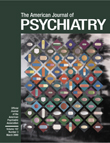Clinical Features of Schizophrenia and Linkage to Chromosomes 5q, 6p, 8p, and 10p in the Irish Study of High-Density Schizophrenia Families
Abstract
OBJECTIVE: Schizophrenia is clinically heterogeneous. Recent linkage studies suggest that multiple genes are important in the etiology of schizophrenia. The authors examined the hypothesis of whether the clinical variability in schizophrenia is due to genetic heterogeneity. METHOD: Using data from the Irish Study of High-Density Schizophrenia Families (N=265 pedigrees; N=1,408 individuals), the authors attempted to predict, from major symptoms and signs of psychosis, evidence for linkage within families for schizophrenia-related disorders to chromosomal regions 5q21–5q31, 6p24–6p22, 8p22–8p21, and 10p15–10p11. RESULTS: No substantial evidence was found for associations between clinical features of schizophrenia and linkage to chromosomes 5q, 6p, or 10p. However, affected individuals from families with evidence for linkage to 8p had significantly more affective deterioration, poorer outcome, more thought disorder, and fewer depressive symptoms than affected individuals from the other families in the study. CONCLUSIONS: These results raise the possibility that the putative susceptibility gene for schizophrenia localized in the 8p22–8p21 region may predispose individuals to the core dementia-praecox syndrome described by Kraepelin more than 100 years ago.



